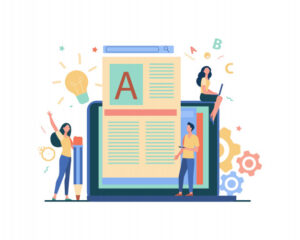For non-native English speakers across the globe, the International English Language Testing System, commonly known as the IELTS, is the go-to option to prove linguistic competence and gain eligibility across several Canadian immigration programs. Hence, there is no surprise in the fact that over an estimated 3.5 million candidates sit for the IELTS exams every year.
Professionals and students who want to study, work, or even live in English-speaking countries might benefit from taking the IELTS exam. This desire can only be accomplished if applicants have a reasonable IELTS score, commonly estimated in the range of 6.0 to 8.0 bands out of the maximum possible.
Are you one of those people looking for the best helpful IELTS tips and strategies to raise your score? Then this post is exactly what you need!
Tips and Strategy for Each Module
The four components of the IELTS exam are speaking, writing, reading, and listening. You will obtain a grade for each module, and your results will be valid for two years.
The total band is based on the four modules and is widely used in university and college admissions. There may be a minimum standard for each course, depending on the school.
The IELTS Academic and General Training tests are broken into four sections. However, the Listening and Speaking sections are identical; the Reading and Writing sections vary according to the test chosen by the applicant.
The IELTS Reading, Writing, and Listening sections all take place on the same day, with no breaks between each one. However, based on the availability of dates at the test site, the Speaking Section of the test can be performed a week before or after the other exams.

Listening
You will have to listen to four recordings (conversations and monologues) to pass this test. Native English speakers are recorded in a range of accents. Keep in mind that you can only listen to each recording once.
You will have to multitask to answer maximum questions in the given time. Reading the questions and listening for the response while writing down words is required. You’ll want to practice this before attempting it.
The number of accurate responses determines your eventual score. The good thing is that you do not have to worry about negative marking for incorrect answers. If you’re unsure, make a calculated assumption. Always fill up the blanks on your response sheet with something meaningful. Who knows, you could be correct in your estimate!
Check the maximum number of words you can use in your response. When the question type changes, it is possible that the maximum permissible word count required for the answer will vary as well.
Here’s an example of writing instructions: “Nothing more than two words and a number” is permitted. Before your exam, you should practice taking a listening test from start to finish by listening just once. The more you do this, the better off you will be.
It’s a good idea to repeat listening exercises while improving your abilities and expanding your vocabulary. When you’re practicing or taking a mock test, this is acceptable.

Reading
The stringent time limit will test your ability to answer questions to the fullest extent.
To perform well on the IELTS, you must quickly skim and read paragraphs. Go through the paragraph to obtain a basic sense of what is going on.
Once you are a little familiar, read it carefully keeping in mind the questions to which you need to find the answers.
You should skim through the whole paragraph in little more than two or three minutes. Simultaneously, make a point of highlighting any essential phrases you come across.
While some may recommend you to acquire speed-reading skills, such skills often require months of practice. If you do not have that kind of time available, focus on maximising your comprehension and marking the keywords mentally as you read through the paragraphs. This will help you locate information in the passage quickly. You must understand both the dictionary meaning of a word and its contextual use in phrases and sentences. Track your progress with an index of every mistake you make in the Reading section on your mock tests.
As a reader, your ability to swiftly find information has little to do with your understanding of the piece.

Writing
Make sure you read and understand the questions before moving on. Initially, your focus should be entirely on classifying the question and what it demands in terms of a response. The first element in writing an essay is deciding on a topic.
You’ve just finished reading the prompt, and your thoughts are (ideally) racing. Plan your essay in conjunction with them. Spend a few moments scribbling down the key ideas and examples that spring to mind.
Your manuscript will be significantly aided by including these ideas and concepts. When it comes to drafting an essay, a well-structured outline gives clarity.
This is a helpful hint to keep in mind while you rummage through your prompts, searching for inspiration. What, who, when, where, why, and how is the solution to the questions. Clearing the veil around the question will enable you to express yourself freely.
Your essay should be free of text abbreviations and social media terminology. Avoid using ‘I’, ‘you’, and other first or second-person pronouns in writing for the test.

Speaking
Speaking is a face-to-face, casual conversation with an IELTS examiner. You will be evaluated on your ability to speak clearly and coherently alongside your command of the English language.
It’s preferable to progressively develop your abilities by practicing a little bit each day than it is to improve your baseline language skills for the whole week leading up to your IELTS lesson.
There are two people involved in your IELTS Speaking exam, and you are supposed to mimic their discourse. It is thus possible to ask the examiner for clarification on any term that you do not understand. If you’re stumped, say, “I’m sorry, but what does ‘X’ mean?”
Alternatively, you might ask the examiner to repeat. However, you can’t request an explanation of the whole phrase from the examiner.
Avoid binary responses or single-term answers. The examiner wants to learn more about your linguistic skills and how well you can communicate your thoughts and ideas. Hence, focus on deliberate and descriptive responses relevant to the question.
In Summary
Understand your baseline language skills and give yourself the time to improve them. The best way to do this is by practising, tracking your mistakes, and improving upon them. Above everything else, remember that IELTS is a test to help the examiner understand how to communicate in English. So, expand your access to words, simplify your sentence construction, and learn how to organize your thoughts before you express them. If you can do this on a high level, you will just need sufficient practice to sail through.
If you need the directions of an expert, feel free to book a session by getting in touch with our team.

0 Comments